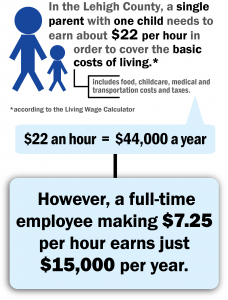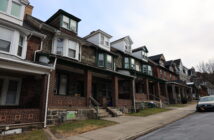The minimum wage in Pennsylvania reflects the federally required level — $7.25 per hour — but state policy lags behind 29 states and the District of Columbia that have raised it even higher.

(Kelly McCoy/B&W Staff)
A single parent with one child in Lehigh County needs to earn about $22 per hour to cover the basic costs of living, according to the Living Wage Calculator, a tool developed by a professor at the Massachusetts Institute of Technology that estimates the lowest income a family can live off of. This calculation accounts for most essential expenses including food, childcare, medical and transportation costs and taxes.
The Self-Sufficiency Standard developed by PathWays PA, a non-profit advocacy organization, states a Lehigh County family of the same size requires an annual income between $40,000 and $45,000 to support itself without public or private assistance — equivalent to about $20 per hour at a full-time job.
By either of these standards, a minimum wage position in Pennsylvania accounts for only a fraction of families’ basic living expenses. A full-time employee making $7.25 per hour earns just $15,000 per year.
Mark Price, a labor economist at the Keystone Research Center, said the primary problem for low wage workers is the diminishing purchasing power of minimum wage. As prices rise by about 3 percent each year, wages remains stagnant. It had been 10 years since the legislature voted to increase Pennsylvania’s minimum wage.
“The things we take for granted, those of us that have higher incomes, are much harder for folks who are earning close to poverty wages,” Price said. “That ends up resulting in people having to rely on public assistance — going to local food banks, or relying on charities to meet very basic needs.”
Paul Lynch, the director of Second Harvest Food Bank in Nazareth, said government support programs help low wage workers make up the difference to an extent, but the current minimum wage simply does not provide enough to get by on.
“Somehow our society has decided that there will always be a segment of our community that’s poor, and the charities and churches and some weak government programs will be the way that we give them sustenance — just barely surviving ability,” Lynch said. “(The minimum wage) is not a real reflection of what it costs to live.”
Alan Jennings, the executive director of the Community Action Committee of the Lehigh Valley, estimates up to half of the people relying on food banks to feed their families are employed to some degree.
“There’s something desperately wrong with a marketplace where people work and can’t afford to pay their bills,” Jennings said. “If you have a job, if you play by the rules, you ought to be able to pay your bills. And that shouldn’t be an arguable point.”
Over the past two years, legislation has been proposed in both Pennsylvania’s state House of Representatives and state Senate to boost the minimum wage to anywhere from $7.75 to $15 per hour. Many of these bills incorporate an annual cost-of-living increase to account for inflation adjustments and some include a raise for tipped workers like restaurant servers that currently earn a base wage of $2.83 per hour.
Raise the Wage PA is a statewide coalition coordinated by the Philadelphia Unemployment Project that calls for an increase to at least $10.10 an hour, a minimum that’s been proposed by several state legislatures.
Adam Goldman, an organizer for the project, said despite overwhelming public support for an increased minimum wage, Republican politicians in the state House and Senate are holding bills up in the committee phase, preventing them from being brought to a vote.
For instance, State Senator Lisa Baker, who represents several counties in Northeast Pennsylvania, is the chair of the Senate labor and industry committee. She has had bills to raise the minimum wage in her committee since January 2015, but so far nothing’s been brought to the floor for consideration.
A spokesperson for Baker did not respond to The Brown and White’s request for comment.
Goldman says elected officials like Baker are “out of step” with voters and a minimum wage hike has garnered bipartisan support across Democratic and Republican constituencies alike.
Democrat Pennsylvania Gov. Tom Wolf publicly supported raising the minimum wage to $10.10 per hour in February 2015, according to The Morning Call. And a recent survey conducted by Public Policy Polling found more than half of Republican primary voters in Pennsylvania are in favor of an increase to at least $10 per hour.
“If the bills ever got to the floor and people were allowed to vote without being constrained by party loyalties, they would pass,” said Janet Ney, Second Harvest’s coordinator of advocacy and outreach.
Opponents of a minimum wage increase such as the National Federation of Independent Business say that it would result in drawbacks for workers. They argue that if employers have to shell out more cash to their employees, they’re likely to lay people off or reduce their hours to counteract the higher costs.
“If the goal is to bring people up out of poverty, raising the minimum wage wouldn’t appear to be accomplishing that,” wrote Suzanne Collins, the communications director of NFIB, in an email.
A National Federation of Independent Business press release from November 2015 cites an Independent Fiscal Office report concluding an increase in the state’s minimum wage to $10.10 an hour would result in a loss of 31,000 jobs in Pennsylvania.
But Price says experience has proven the opposite to be true — other states did not see any negative impacts on employment following minimum wage increases across the country.
“It may take an extra few weeks to find a job after an increase happens,” Price said. “But you’ll still eventually find one. And you’ll find it at a much higher wage. And you’ll still be better off at the end of the year than if the minimum wage were not increased.”
Although some economists suggest there may be small negative employment effects, Price says the debate has shifted to favor the widespread beneficiaries of an increase over the potential losses.
Data from the Keystone Research Center suggests that an increase to $10.10 per hour would lift wages for 1.2 million people across Pennsylvania — nearly a quarter of the state’s workforce, including more than 35,000 people in Lehigh County alone.
Price says history has shown that boosting wages boosts the economy too, because those higher wages will be spent.
Keystone Research Center analysis estimates that a raise to $10.10 per hour would increase total wages in Pennsylvania by $1.8 billion and as a result, the additional spending in the economy would generate about 6,000 more jobs — a modest increase in employment, but an increase nonetheless.
“One of the things we know about the less income you have is that you spend every dime you’ve got,” Price said. “Every dollar coming in through work ends up getting spent on rent and food and groceries and clothes . . . My spending is someone else’s income.”
So when might there be change?
According to Raise the Wage PA’s website, nearly a dozen bills have been proposed in the state Senate and House but to date, there hasn’t been much movement on the issue. In the meantime, Goldman says organizations like the Philadelphia Unemployment Project will continue pushing until the minimum wage is raised.





Comment policy
Comments posted to The Brown and White website are reviewed by a moderator before being approved. Incendiary speech or harassing language, including comments targeted at individuals, may be deemed unacceptable and not published. Spam and other soliciting will also be declined.
The Brown and White also reserves the right to not publish entirely anonymous comments.
4 Comments
With nationwide businesses raises wages to $9-$10/hour, the time has definitely come to raise the minimum wage to $10.10/hour. With there being proponents from both parties favoring the decision, there is no reason to delay bringing the issue to the floor for a vote. My husband works for a national company that is still only paying $8.10/hour. We are fortunate enough to own our home and one of our vehicles because it would be impossible otherwise. I still, because we are nearing retirement age, would like to be saving for retirement as well as have more spending money. My hope is that my voice will be heard and this issue will be addressed in this year(2016) and will not be ignored any longer!
I recently took a job in Pa that pays based off minimum wage and commission. I used to live and work in New Jersey, and when the offer to become a manager came in a PA store I jumped at the opportunity, but seeing as how the minimum wage is so far lower than NJ, I would have been better off in NJ! Its completely ridiculous that PA is so far behind, NJ, Delaware, NY… Raise the wage or risk East Pennsylvania residents crossing the bridge for better pay.
The sad thing about Penna. not raising the minimum wage is that after hiring jump for the holidays, so 7.25 could generate extra dollars for 7.25 workers i.e.. overtime, call outs job hoppers. There was plenty of work. After the holidays those same workers were let go, quit and with slowing down of business, the steady workers hours were cut to recoup the increase for the holiday pay outs. Who needs a 4 hour week, a 8 hour week at 7.25 per hour. The cost of commuting to the job eats it up, any plans for bill payment is thrown into a loop and it just not ethical. Shame on those people WE elected to represent us who only represent them selves. CHEERS FOR GOVERNOR WOLF WHO RECOGNIZE THE NEEDS OF THE PEOPLE OF PENNSYLVANIA WHOM! HE REPRESENTS!
HMW PHILADELPHIA PA.
On 20/20 an expert said and I quote “paying someone $7.25 an hour is like telling them your work doesn’t matter” I agree with that if it wasn’t for the minimum wage workers where and what would the higher paid worker’s and rich people do and be.